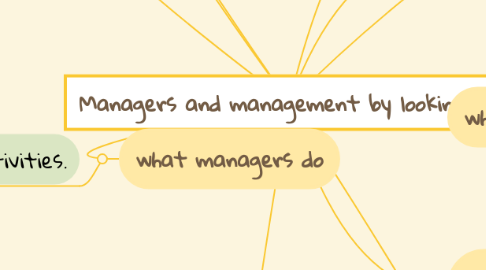
1. what managers do
1.1. management is what managers do and involves coordinating and overseeing the efficient and effective completion of others' work activities.
1.1.1. Management function
1.1.1.1. Planning
1.1.1.2. Organizing
1.1.1.3. Leading
1.1.1.4. Controlling
1.1.2. Managerial roles
1.1.2.1. Interpersonal
1.1.2.2. Informational
1.1.2.3. Decisional
1.1.3. managerial skills
1.1.3.1. Technical
1.1.3.2. interpersonal
1.1.3.3. Conceptual
2. Looking at the factors reshaping and redefining the manager’s job
2.1. The changes impacting managers' jobs include global economic and political uncertainties, changing workplaces, ethical issues, security threats, and changing tech nology.
2.1.1. Managers must focus with
2.1.1.1. Customer service
2.1.1.2. Technology
2.1.1.3. Social media
2.1.1.4. Innovation
2.1.1.5. Sustainability
2.1.1.6. Employees
3. The value of studying management
3.1. The universality of management
3.1.1. Which refers to the fact that managers are needed in all types and sizes of orga nizations, at all organizational levels and work areas, and in all global locations;
3.2. The reality of work
3.2.1. You will either manage or be managed
3.3. The awareness of the significant rewards and challenge
3.3.1. Having to work hard
3.3.2. Interacting with a variety of personalities
3.3.3. Creating work environments to help people work to the best of their ability
4. The development and uses of the behavioral approach
4.1. People are the most important asset of an organization and must be managed accordingly
5. The various theories in the contemporary approach
5.1. This approach provides a framework to help managers understand how all the interdependent units work together to achieve the organization's goals and that decisions and actions taken in one organizational area will affect others
6. The various theories in the classical approach.
6.1. Frederick W. Taylor
6.1.1. Studied manual work using scientific principles-that is, guidelines for improving production efficiency to find the one best way to do those jobs.
6.2. The Gilbreths'
6.2.1. Weber described an ideal type of organization he called a bureaucracy-characteristics that many of today's large organizations still have.
6.2.2. The Gilbreths' primary contribution was finding efficient hand-and-body motions and designing proper tools and equipment for optimizing work performance.
6.3. Fayol
6.3.1. He developed 14 principles of management from which many current management concepts have evolved.
